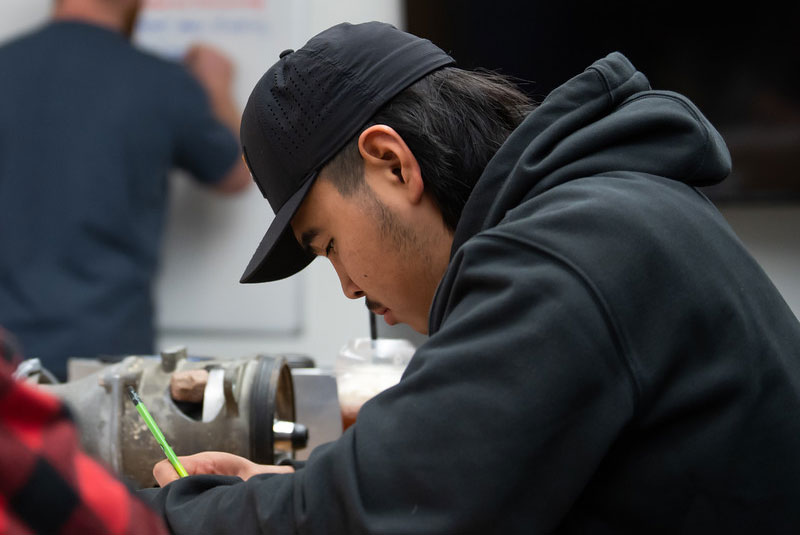Alumni spotlight: Raife Bowman
by Vicki Heisser |
Raife Bowman was born in Idaho and raised in Alaska. After earning his GED, he enlisted
in the United States Army, where he displayed commitment and bravery. He received
an honorable discharge, gaining valuable experience and leadership skills for civilian
life.
After completing his military service, he enrolled in the Yearlong Wilderness Bushcraft
Immersion Program at Jack Mountain Bushcraft School in Maine. There, he discovered
his passion for wilderness education. He then obtained an Associate of Applied Science
degree in Outdoor Leadership from Prince William Sound College and became a certified
Wilderness EMT and AIARE Level 1.
Using this experience, he founded Arctic Field Craft, focusing on outdoor adventures
that help others connect with nature. As his business grew, he balanced his roles
as an entrepreneur, husband, and father, ultimately seizing an opportunity to work
in Antarctica.
We recently met him to discuss life in Antarctica, where he shared his experiences.
PWSC: What does a typical day look like for you while working in Antarctica?
Raife: At McMurdo Station, life resembles a small town in Alaska—a few hundred residents,
one dining hall, and many tasks to tackle. However, once we venture out on the trails,
the experience transforms dramatically. I'm part of a team of six tasked with transporting
scientific equipment to a remote location hundreds of miles from the South Pole—an
area that remains largely unexplored. Our expedition spans about two months and covers
over 1,200 miles. Once we arrive, we'll establish a snow runway for aircraft to deliver
scientists for a month before packing up and heading home.
The living conditions can be challenging: there's no laundry, just a small bucket
for washing socks and underwear, and we must carefully collect and return all human
waste to minimize our environmental footprint.
PWSC: How do you adapt your outdoor leadership skills to the unique environment of
Antarctica?
Raife: I currently serve as a heavy equipment operator, but the role demands a diverse
skill set. We'll navigate crevasse fields, necessitating training in crevasse rescue.
My rock and ice climbing background at PWSC has been invaluable, though I wish I had
taken a dedicated crevasse rescue course there. I've also found sewing skills crucial
for repairs and maintenance. Additionally, the Antarctic Field Survival class provided
a hands-on experience that I've been able to share with less experienced team members—especially
with equipment like the Whisperlite stove, which can be tricky for newcomers.
PWSC: How do you balance your work commitments in Antarctica with your responsibilities
as a spouse and parent, and do you stay connected?
Raife: Balancing my work in Antarctica with family life is quite challenging. I'm
away from August to the end of March, missing significant holidays and milestones
like my son's fifth birthday. Fortunately, with Starlink, I can connect with my family
almost daily. The only internet access is in the sleeping area, which complicates
communication due to the 22-hour time difference. Nonetheless, we make it work. My
wife is an incredible partner, managing everything at home and ensuring our family
is cared for while I'm gone.
PWSC: What are some of the biggest challenges you've faced while living and working
in such a remote location, and what is the most rewarding aspect of your work in Antarctica?
Raife: One of the primary challenges here is navigating the bureaucracy—everything
tends to move at a glacial pace, and I struggle with delays. The transportation of
goods is remarkably complex, and living on a remote island with unpredictable weather
and a snow runway adds layers of difficulty.
Yet, the rewards are immense. I'm captivated by the history surrounding this place,
like Robert Falcon Scott's hut, which still stands and can be toured. I have the opportunity
to operate extraordinary equipment that many people have never even seen. Recently,
I enjoyed coffee at the base of the world's southernmost active volcano, and just
days ago, we spotted Emperor Penguins on the airfield.
This adventure is straight out of my dreams.









